- Home
- Gavin Chappell
Murder in Hadrian's Villa Page 18
Murder in Hadrian's Villa Read online
Page 18
It had bothered him that some of the other tribunes looked down their noses at him in the mess, since he was a commander of barbarian troops rather than Roman citizens, but he hadn’t had the connections of people such as Tribune Karus, who came from a senatorial family and naturally commanded the finest legionaries from good Roman stock.
It had seemed a terrible burden at the time, although he had come to revel in the company of his men, Frisians like Hrodmar and his fellows. Few of them spoke very good Latin, while only the best Latin was spoken in the mess, but he’d felt at ease and at home with his barbarian horsemen. He felt something of that now, riding beneath the bright Italian sun with these Germanic cavalrymen, although the Imperial Horse Guards were the cream of the auxiliaries, unlike his turbulent Frisians.
He was beginning to enjoy himself too much. He was on a serious mission, he told himself, not out for a gallop in the countryside. Anywhere, on either side of the road, the robbers could be massing.
They had reached a lonely stretch, the river on one side and open country on the other. Marauders could be concealed within that olive grove he could see on the horizon, or behind that rocky outcrop they were just passing. It wouldn’t do to become too complacent. He knew for a fact that they were going to be attacked at some point.
And yet the attack did not come. The Horse Guards rode on.
Flaminius began to feel foolish. Their plans were based on a line of ciphered writing found in the effects of a murdered centurion. The conspirators could easily have changed the plan since then. As the day drew on and the riders rode ever closer to the outskirts of Rome, Flaminius grew more and more convinced that the plan had changed.
He felt both relief and some embarrassment. Relief, that he would not have to face an attack from an unknown number of robbers; embarrassment, that he had persuaded Probus and Cassius Nero to organise the entire exercise now that it was looking like it was to no avail. It would be good if he could ensure that the pay was brought into Rome without difficulty, but he had staked a lot on the hope that they would capture some of the conspirators, and find out what lay at the heart of the mystery.
At the start they had ridden along the bank of the Tiber, but after six miles the road had continued straight on while the river curved away to the south. Now they were riding into the hills that lay between here and Rome, the route to the Aemilian Bridge from which the road began. The hills were deserted and quiet, the road empty but for the riders, the skies above empty but for circling birds. The silence was ominous.
But still they rode on. The sun was high in the sky. It was nearly noon. No wonder few travellers were on the roads; anyone with any sense was having their siesta now. Should they halt themselves, he wondered, and continue a few hours later when it grew cooler?
Decurion Segomarus rode up. He was mopping at his brow beneath the heavy helmet he wore, and his pale German skin was an angry red.
‘Sir?’ he said, riding alongside. His Latin was hard to follow due to his thick accent. ‘It’s getting hot. Shouldn’t we rest?’
Before Flaminius could reply the air whistled jauntily and suddenly a thin branch grew out of Segomarus’ neck. He exchanged a disbelieving glance with the decurion and Segomarus slid slowly off his horse. In a horror Flaminius recognised the branch as an arrow.
He looked about him, glimpsing figures running amidst the thorn bushes on one side of the road. The air whistled again and arrows filled it like angry hornets. Two more men fell before Flaminius shouted an order. The survivors raised shields and formed a square around the pack mules. Horses galloped madly, dust rose up from the road surface.
Flaminius scanned the surrounding landscape. Bowmen were visible two hundred yards away, crouching amid thorns where the horses couldn’t go.
He called forward his horse archers. The four men rode forwards. Flaminius gestured at the ambushers among the thorns. ‘Loose!’
The horse archers returned the fire of the robbers. Flaminius looked about him warily. Surely they could expect more than simply a missile attack? As if to confirm his suspicions, he heard a clamour from behind, and turned to see the far side of the square under attack.
The attackers were armoured men on horseback, and they wore paradeground helmets whose Amazon faceplates kept their features concealed. His Horse Guards fought back manfully but as they did, dozens more riders burst out from behind a rocky outcrop and streamed towards the embattled warriors.
He drew his sword and galloped round the square. The hilt was firm and fitted sweetly into his hand. Despite the noonday heat and the acrid dust, as arrows swooped through the air and the ring of blade on blade echoed from the rocks, he again found himself cast back to rainy Britain, fighting hostile barbarians at the head of his auxiliary troop. Reaching the side facing the new attackers, he tugged at his horse’s reins, turned his head to the men on this side and bellowed at them.
‘Stand firm!’ he told them. ‘Protect those mules!’
The road thundered with the sound of hoofs. He turned to see the robbers, who also hid their identity behind masked helmets, spurring their steeds as they charged the square. They carried lances that looked like they were military issue, and flashed in the bright sunlight as they levelled them at the patiently waiting Horse Guards.
Then they hit, and all was thrown into chaos and confusion on Flaminius’ side of the square.
Helmeted figures thrust lances. Horses screamed, men fell in the dust. Blades flashed dazzlingly in the spring sunlight.
Heart pounding, Flaminius swung his long sword at the nearest rider. The man caught the blow with his shield—which had been painted a deep black—then lunged at Flaminius with his lance. Gritting his teeth, Flaminius hacked off the lance head with a swinging blow then thrust his sword backhanded to sink it under the faceplate of his attacker’s helmet. With a muffled cry, the man dropped from his horse.
Even as he turned, Flaminius flinched as a sword was swung straight at him. It clanged from his helmet, dazing him. His vision cleared and he saw another robber was attacking him, sword swinging. He raised his own and parried the swashing blows, then lunged when the man paused for breath. He heard a harsh curse in a foreign language as his blade sank into flesh, broke through bone, and the man fell back in a miasma of gore.
Tugging at his reins with his left hand, Flaminius drew back to assess the situation unfolding around him. All along this side of the square, robbers and Horse Guards were embattled. On two other sides, fighting was ongoing. The final side, that facing down the road towards Rome, stood firm. But even as he watched, the robbers broke through on the side that had been attacked by archers, seven or eight of them whooping madly as they rode towards the heavily laden mules.
Where in Hades was Probus and his commissary legionaries? The plan was all going awry. Flaminius grabbed his trumpeter and shouted, ‘Give the call to fall back to the baggage animals!’
Three clear blasts, repeated several times, broke the roar of the fight, and the Horse Guards began to disengage and bunch around the braying, terrified mules. Flaminius rode straight for the leader of the men who had broken through, swinging his sword as he came closer. The leader, whose red beard peeped out from beneath his masked helmet, reached out to grab the bridle of a bucking mule. As he did so, Flaminius brought his blade whipping down.
It sliced through the man’s wrist with a grisly sound of breaking bone, audible even over the noise of fighting, and blood sprayed across the terrified pack animal. The mule broke and ran, throwing its pack, skittering round and round the road like a mad thing as it met rider after rider. Then it broke free and vanished into the rocks.
The man Flaminius had attacked was hanging half off his saddle as his horse reared, and the road was black with blood. The robbers were prevailing. Flaminius reached out to grab the bridle of the man’s horse and led it away, then ordered the nearby trumpeter to sound the retreat.
The surviving Horse Guards split from the fight and followed Flaminius and the trumpet
er down the road to Rome.
At the next rise, Flaminius halted, his riders milling around him, and looked back with a pang of regret to see the robbers vanishing into the surrounding thickets, driving the mules before them. Huddled bodies, men and horses, lay in the road. Kites and ravens circled speculatively in the air high above. As Flaminius looked back, the man whose horse he had seized slid off it.
He jumped down and went to investigate. The man lay still. He wasn’t breathing. Closer inspection revealed he was dead, no doubt of blood loss from his severed wrist. Flaminius tore back the faceplate of the helmet to reveal a bearded face, with the red hair and the blue eyes he associated with the Germans of the Horse Guard.
Two Horse Guards rode up, leading between them a robber who they had sat on his horse facing the tail. His helmet faceplate was pulled up to reveal another classically Germanic face.
‘We took prisoner,’ one Horse Guard said. ‘Man of the Suebi, my people’s enemies.’
Flaminius remounted and rode towards the prisoner. He battered and bruised but didn’t look likely to die on them. Much better than the handless corpse he had captured. Again, it was a Germanic barbarian—an auxiliary?
‘I know this man,’ said Segomarus, riding forwards, an angry look on his ruddy features. ‘One of us! A Horse Guard! Hildred is his name.’ He struck the man across the side of the head.
‘That’s enough, decurion,’ Flaminius told him.
‘But sir,’ Segomarus said. ‘He brings shame on all our people!’ The rest of the Horse Guards rumbled their discontent.
‘Who put you up to this?’ Flaminius asked Hildred. The renegade looked back at him in silence, and shook his head.
‘He won’t tell you,’ Segomarus said impatiently. ‘Let us light a fire and heat up some irons. We’ll soon force the truth from the traitor.’
‘No. We’ll take him back with us,’ said Flaminius. ‘The commissary has interrogators who will obtain the facts with more subtlety. We’ll learn who was behind this attack. Some of you, ride back to the hill and gather the dead. They’ll receive burial in Rome.’
Honourable burial, he hoped, although he had his doubts about the renegades.
Segomarus detailed a group of Horse Guards to carry out the order. He rode closer to Flaminius, still keeping his eyes on the taciturn Hildred. ‘This is a matter between my country folk,’ he said in an urgent, low voice. ‘Best settled by us!’
Flaminius shook his head, imperturbable. ‘You and your men will be well rewarded,’ he said. ‘But Hildred is a prisoner of the commissary. I was hoping for more captives than this, but the attackers were too many and too much of a match for us.’
He wondered what had happened to Probus.
‘Do you think they were all Horse Guards?’ Segomarus asked as they rode on. ‘What treachery is this? They stole the money we were supposed to be guarding. Our own pay, some of it.’
The men sent to gather the bodies of the slain Horse Guards were beginning to trot back, their dead comrades bundled over the backs of their former steeds. Flaminius didn’t answer Segomarus’ question—he hoped the sacrifice would be worth it, now that they had a captive to question—but instead he sat watching the approach of his men.
Lifting a hand he gestured Romewards. ‘Ride!’ he commanded.
They reached the suburbs as people were arising from their siesta. The streets were almost deserted as they galloped towards the Aemilian Bridge, but by the time they had reached the Caelian Hill the city was bustling.
The Horse Guards rode into the Castra Peregrina and Segomarus gave the prisoner into commissary custody before the troop departed to its own barracks, taking with them the bodies of the slain. Flaminius remained with the prisoner and two commissary legionaries.
Probus entered the courtyard at the head of a group of legionaries. They led several captives—Germans, bearded and bound. Probus saluted as Flaminius came forward anxiously.
‘Where were you?’ the tribune demanded. ‘We were attacked as we crossed the hills. There was no sign of you. Several of my men were killed.’
Probus was tired and travel stained but seemed more alive than he had in weeks. He gestured to the captives with his thumb.
‘We weren’t far away, but you were too quick for us. You rode off before we could catch up. But we rounded up this little flock of barbarians.’
Flaminius examined Probus’ captives. This changed matters. He had been worried that his own prisoner might prove intractable, but with so many to choose from they would surely be able to extract the information they needed.
‘Aren’t you going to say thank you?’ Probus added mockingly. ‘The real pay should be being offloaded at a jetty on the Tiber in a short while.’
‘What?’ Flaminius said, astounded. ‘The real pay? The pay was taken by robbers!’
‘We sent the money by a different route,’ Probus said. ‘We filled the wages train with junk to imitate money, but the money itself was taken up the Tiber. We used this as an attempt to trap the robbers.’
‘You could have at least told me!’ Flaminius said. Turning to the legionaries, he gestured at the captives. ‘Take them away. They’ll be interrogated in their turn.’
He went inside to report to Cassius Nero and Probus went with him.
‘So it seems your plan was a success,’ the Chief said to Probus with grim approval, after he had listened to the tribune’s report. ‘You got the prisoners you wanted, and the strongboxes containing the real money are being taken under armed guard to the Praetorian camp as we speak.’
‘Now all we have to do is see what information we can get from them,’ Flaminius said. ‘They seem to be members of the Imperial Horse Guards, but the captive I took refused to admit who told him to make this attack. All of them were kitted out with paradeground helmets, ensuring that their faces were covered.’
There was a knock at the door. Impatiently, the Chief barked, ‘Enter.’
Junius Italicus entered, looking agitated. ‘Chief,’ he said, saluting. ‘The men detailed to escort the pay from the river to the camp…’
‘Well?’ the Chief demanded.
‘They’ve been attacked,’ he said. ‘In broad daylight. Several were killed. The money’s been taken. The prefect wants to speak to you,’ he added.
The Chief rose. ‘Oh, he does, does he?’ he barked. He turned to Flaminius and Probus. ‘Stay here. I’ll go and speak to Septicius Clarus.’
He stalked out of the office. As Junius Italicus turned to follow him, he looked at Flaminius and saluted again. ‘The empress sends her compliments,’ he said, ‘and she wishes to see the cohort on duty at the palace as soon as possible. She has decided to retire to the Villa for the foreseeable future, and request you attend her tomorrow.’
‘Thanks, centurion,’ Flaminius said. ‘I’ll arrange it when this is over.’
Probus and Flaminius were left alone in Cassius Nero’s office.
‘The conniving bastard!’ Probus exploded. ‘He’s at the back of it and he has the gall to call the Chief to his office to complain that his own men have robbed their wages!’ He shook his head. ‘You have to admire his cheek, I suppose.’
Flaminius didn’t agree. ‘Men have died today,’ he said. ‘And for what? Money that was stolen anyway. You realise what this means? Unless we can find some real evidence to present to the empress, Septicius Clarus will be able to carry out his coup, and who knows what will be waiting for Hadrian when he returns.’
Again he remembered Agamemnon’s homecoming.
‘All our planning has been wasted,’ he added. ‘We’ve got nowhere.’
‘We have won something today,’ Probus insisted. ‘We have those prisoners. If one of them’s willing to blab, we’ll have evidence against the conspirators. And that’s what we need.’
He turned on his heel. ‘I’ll begin the interrogations,’ he said. ‘Meanwhile, it’s time for you to return to duty… but don’t be expecting any pay in the near future. Don’t worry, whe
n the conspirators make themselves a new emperor, you’ll all get a bonus.’
They parted in the corridor. Probus hurried down to the interrogation room, but Flaminius headed for the exit. He’d have to go to the Praetorian camp and round up his cohort. After that, he was at the empress’ bidding. Having savoured all the dubious excitements that Rome had had to offer him, he thought he might enjoy a nice relaxing trip into the countryside.
—19—
Tibur, Hadrian’s Villa, 14th April, 122 AD
A day later he was riding at the head of his cohort, escorting the empress and her retinue up the tree lined drive of the Villa.
Junius Italicus rode at his side. Behind him marched the Praetorians, and in their midst was the empress’ carriage, containing the empress herself and her closest slaves. It was followed by another containing her handmaidens. Riding alongside were several men including Ursus Servianus. Also among them, riding on an ass, was Suetonius Tranquillus.
Septicius Clarus had been kept behind by Praetorian matters—no doubt he was plotting something, Flaminius told himself—but somehow the imperial secretary and the prefect seemed to have become reconciled.
Flaminius hoped Probus would be speedy in getting a confession out of the imprisoned Horse Guards. The conspirators must be close to making their move. He looked back at the handmaidens’ carriage.
He’d seen very little of Medea recently; it seemed the empress had discouraged her away consorting with him. The empress herself had spoken to him very little other than to ask how the investigation was proceeding, although she had hinted at a further, more in-depth discussion at a later time.
‘Looking for your little friend?’
Junius Italicus was staring quizzically at him. Flaminius grunted something meaningless and looked ahead to where the terraces and lawns of the Villa were coming steadily closer.

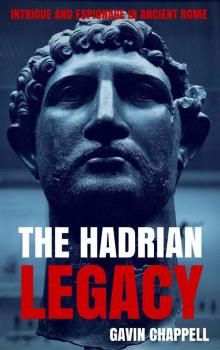 The Hadrian Legacy
The Hadrian Legacy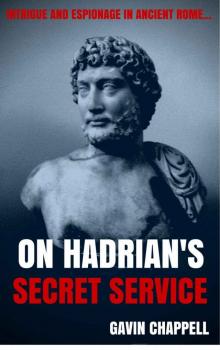 On Hadrian's Secret Service
On Hadrian's Secret Service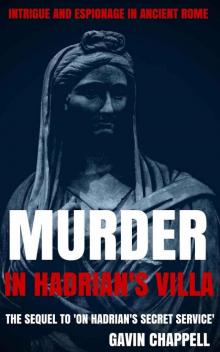 Murder in Hadrian's Villa
Murder in Hadrian's Villa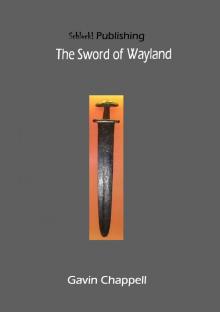 The Sword of Wayland
The Sword of Wayland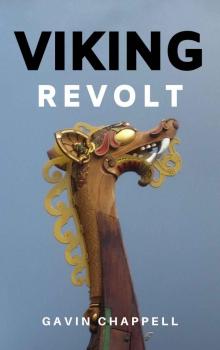 Viking Revolt
Viking Revolt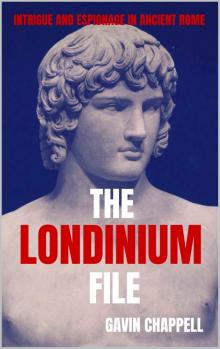 The Londinium File
The Londinium File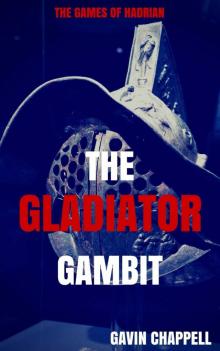 The Gladiator Gambit
The Gladiator Gambit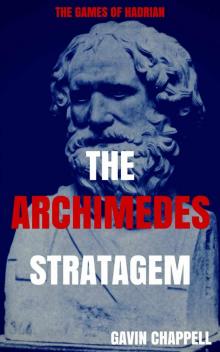 The Archimedes Stratagem
The Archimedes Stratagem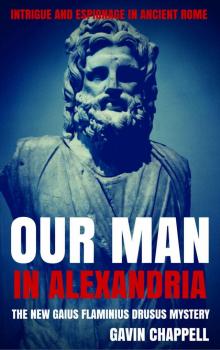 Our Man in Alexandria
Our Man in Alexandria Into the Void (The Dungeoneers)
Into the Void (The Dungeoneers)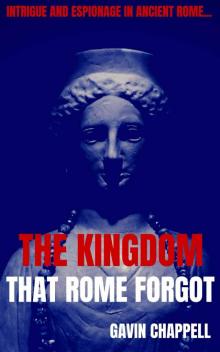 The Kingdom That Rome Forgot
The Kingdom That Rome Forgot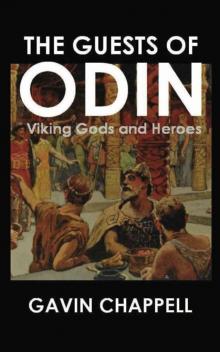 The Guests of Odin
The Guests of Odin